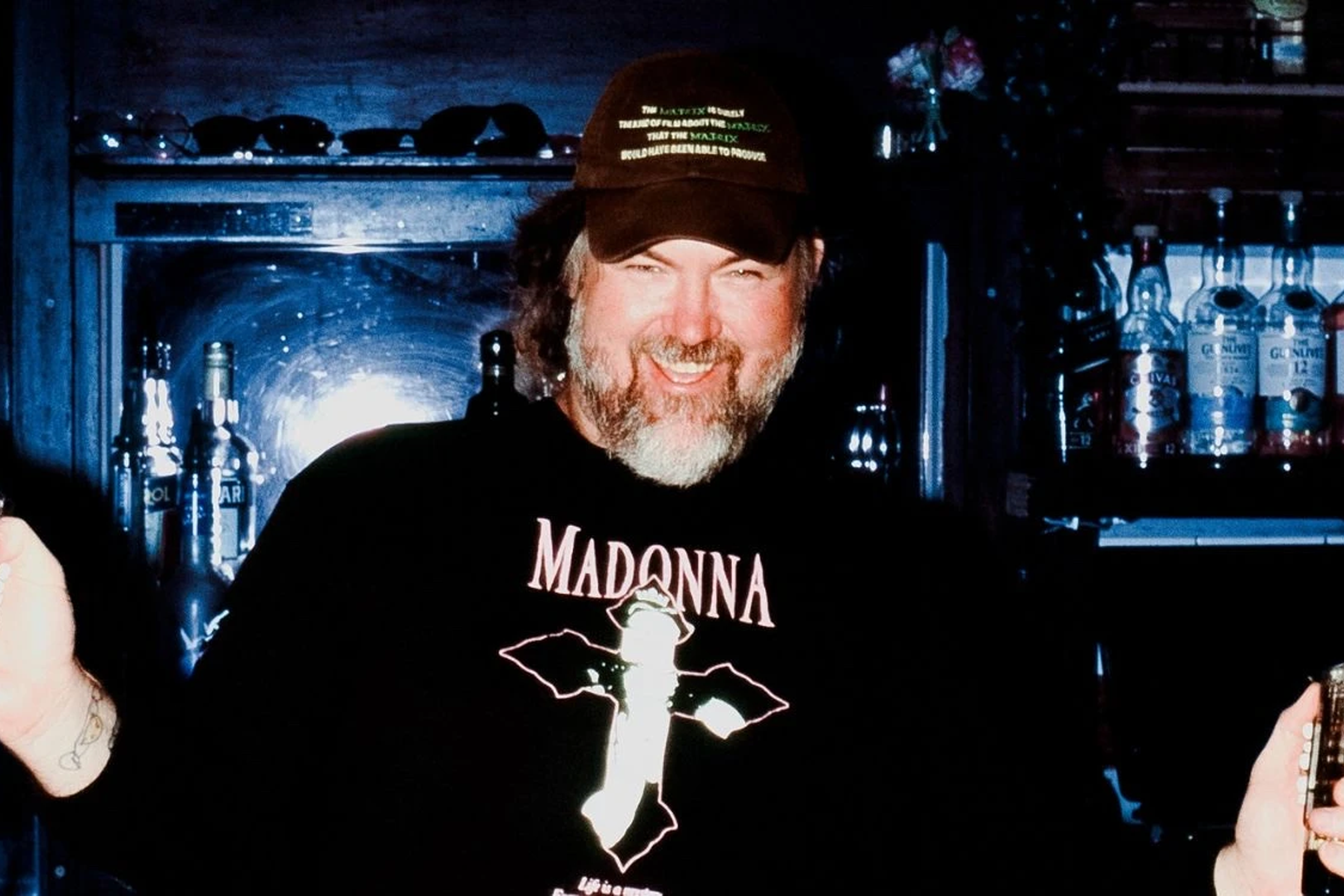 INTERVIEWS
INTERVIEWS
Celebrating 25 years of DJing with Barney Kato
One of Gadigal Land/Sydney's most iconic DJs shares his some of his biggest learnings as he celebrates his Silver Jubilee.
When someone on the dance floor says they were born after the year 2000, for many, that’s a moment to shudder at. In a culture with an increasingly shortening trend cycle, and a country with as short a collection of Poppies as ours, more experienced artists, local DJs, and punters are harder to come by than in other parts of the world.
For some, that would be a reason to stay home.
For Barney Kato, it’s a badge of honour.
This past month, the iconic Muloobinba/Newcastle-born but Gadigal Land/Sydney-homed artist has celebrated 25 years of DJing, a Silver Jubilee worthy of recognition by the Crown. In doing so, Kato has organised a series of shows to celebrate, covering many of his favourite spots, local acts and of course, genres. Part wedding, part birthday, zero parts retirement party, the tour has given Barney the chance to reflect on a quarter century of doing what he loves and to share in that joy with the people around him.
His relationship with music isn’t casual; it’s a committed one. From his earliest days in Muloobinba in the 90s to finding his feet on Gadigal Land, witnessing the inspiration for an iconic Black Eyed Peas hit, and remaining a recognisably enthusiastic member of his local scene, Kato’s 25 years have been nothing short of immaculate and all too aspirational.
To celebrate and reflect on a small part of what’s made that Jubilee so Silver, he sat down with Mixmag ANZ for an extended conversation.
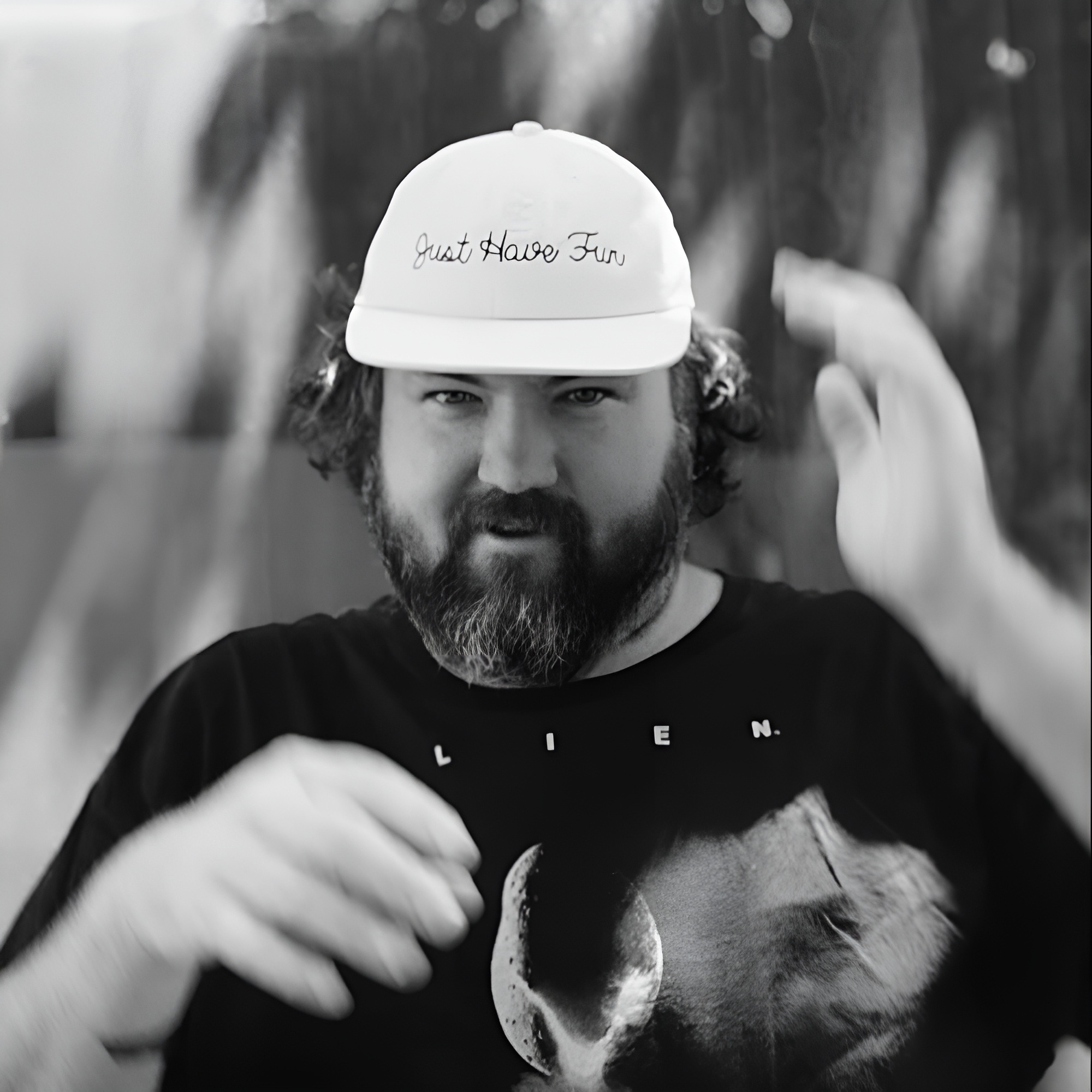
Q: Kato, thanks so much for your time. What a huge milestone to be talking about today. Are you doing this like a birthday, a wedding anniversary or neither?
KATO: The joke was that it was like a retirement party without a retirement. Like, I’m not actually quitting. I made a joke about it, and so many people just said, “Oh, sorry to hear that. Oh, you’re getting out of it.” And I’m like, “Oh, not really. I just thought it was funny.” So, I don’t know. It’s a bit of everything, really.
I do kind of feel a bit like I’m married to music in a way, or married to what I do. So it’s an anniversary in that way. Is it a birthday? Yeah, it’s a little bit of all those. I just wanted it to be a fun little series of things to do.
Q: I feel like there are so many photos and videos and all sorts about where dance music is now, right? It’s really documented. But I’d love to know, in your time over the last 25 years, what some of the rumours or insane stories you’ve witnessed might have been lost to time?
KATO: This is a tough question. What might have been lost to time is just how, when I started, there was hardly anyone DJing. There was hardly any coverage of it at all. It wasn’t fashionable at all. It was just like super normal, people going out. Like, I started in Newcastle as well, so it was really just, I think it’s still this way, working-class people who finished work having a good time. But there was no promotion.
There were no websites where you could find out about stuff, even when I first started. So it’s almost like what I’m saying is just the scene itself, and the music was legendary because we didn’t know what it was at the time. I would read about a rave on the internet. I didn’t know; it was a year or two into it before I went to what was like my ‘first real rave party’, which was a Happy Valley. One of those big outdoor things, and I don’t even know if I loved it or not. It was a sensory overload. I was like, “Oh, yeah, I guess this is the thing to go to,” and I couldn’t even find a stage of music that I 100% liked.
I could tell something really cool was happening. That party definitely made me realise that there was a bit more politics to it. People were wearing t-shirts with slogans that were more political and had similar themes. So I was like, “Oh wow, this is a lot more than just going out, hedonism, and having a good time.”
That’s where I started to learn about how rave culture, even Happy Valley itself, had been controversial over the years. That was quite interesting to learn more about. The stalls for drug safety and all that kind of stuff, which, as a kid in Newcastle, or just going to a couple of clubs, I hadn’t really been exposed to. I didn’t know those issues existed.
A lot of that might be a boring answer to the question, but everything was new, and it felt like I was discovering a hidden universe, which is something we might miss a bit today with all the coverage.
Q: It’s a lot more populated now than it ever has been before, which is no doubt a product of being more publicised. Do you think that’s a high price to pay?
KATO: In some ways, yes, and in some ways, no. I like that the amount of music now is so diverse. It’s almost like there are all these crazy little archipelagos of totally different scenes. As I’ve discovered through the store and selling records, people are into so many different things. People contextualise music in many different ways. Some people like techno mixed with hard trance, while others prefer hypnotic techno or whatever. Some people only like breakbeat and jungle, but even within those genres, there are tiny microcosms. It’s almost like all the different parties have their own unique vibe.
Because there are so many different ways of accessing music, the music landscape is incredibly diverse. You find a lot of unique points of difference now, which is excellent. But on the other side, there’s definitely this chase of video clips, and if you watch too much social media, what’s getting ‘seen’ is someone playing to 10,000 people in Europe, and that’s almost become the standard for what sells tickets or what people expect.
People have that expectation that applies to every single party. So they come to an underground warehouse party, expecting something like Boiler Room Italy with 10,000 people. How do we convince people that it can just be fun to be with 200 people in a warehouse, without experiencing sensory overload? You can still have a great time, more intimate, with fewer people, and less of a spectacle.
Q: Do you think that kind of ‘globalised’, for lack of a better term, approach to dance music culture has come at the cost of the local DJ? Because I feel like, up until now, the local DJ had a lot more weight, right? You yourself have often been looked to as one of Sydney's local DJs. Where do you think that term sits in 2025?
KATO: Yeah, I think it’s very different. When I started, for instance, I was one of about five or six DJs playing in Newcastle on a weekend. Maybe there were a few more than that, but it wasn’t crazy. And that was definitely reflected in the music I played; only a couple of people were involved. Over the past 25 years, that number has grown exponentially almost every year. There are more and more people doing it now, which is awesome.
But it did sort of reach an interesting point, I would say, about five or ten years in, when festivals started dropping Australian DJs from the main stages or relegating them to the smaller stages. I used to play at the bigger festivals around Sydney, but over time, my set times went from five in the afternoon to three, and then eventually, I wasn’t playing at all or was playing on smaller stages.
A lot of that had to do with internet access to music, being able to watch videos of DJs, as I just mentioned. This happens with music in general: whatever has the highest bandwidth tends to suck up all the big sets, and the smaller local DJs get relegated.
But I’m not bitter about that; it’s just the way it is. I try to focus on myself and always try not to think about anyone else, just aiming to be the best Barney Kato I can be. That makes sense to me. But yeah, it’s definitely different now.
Now I think more about working with the community in Sydney and helping out friends and all that kind of stuff. I think it would be cool to create events that are less focused on bringing people from overseas. A lot of the smaller events people do exactly that, which is really cool.
So, I feel like local DJs are now focused on building local communities and creating small scenes that can also reach overseas and integrate people from abroad, but without relying on that too much.
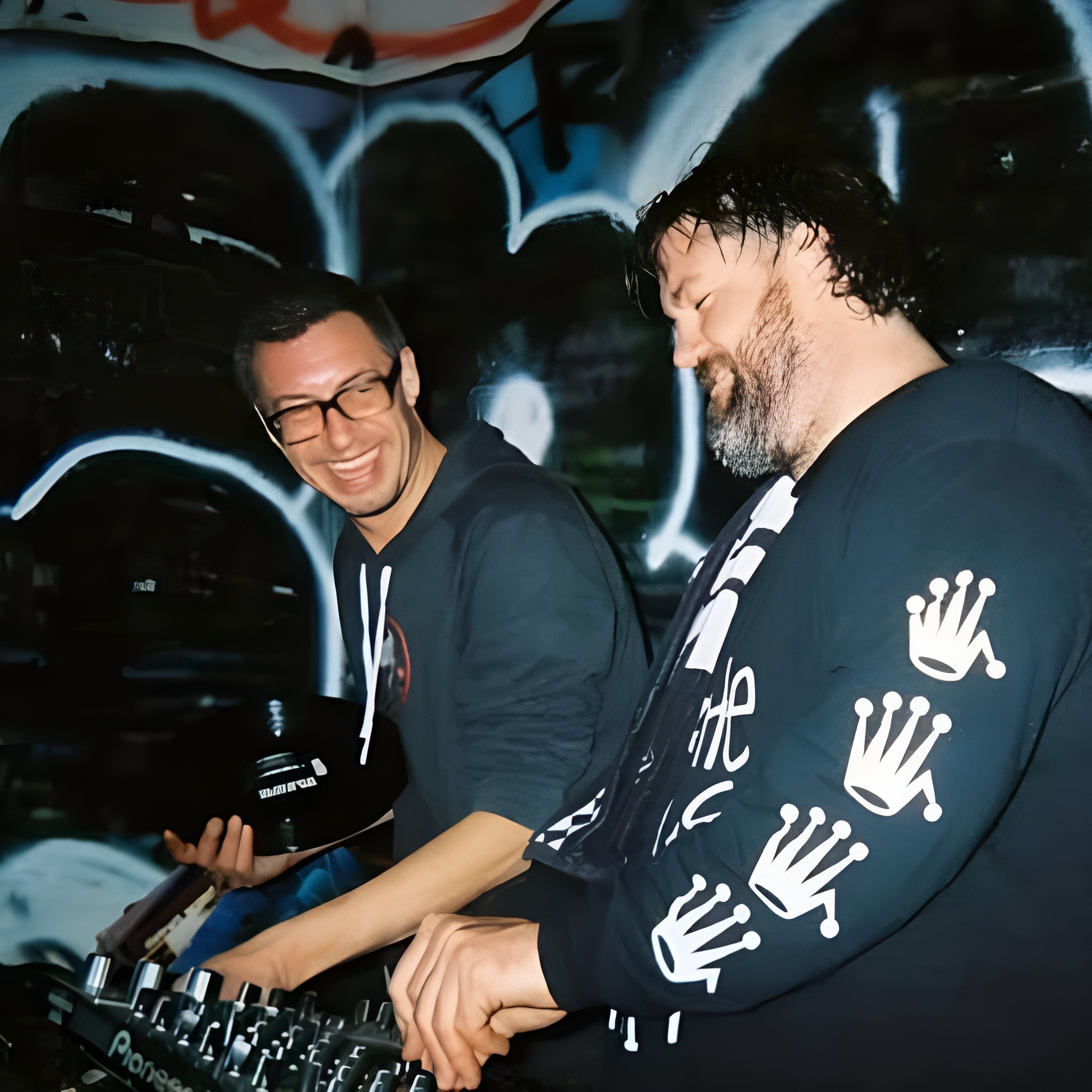
Q: There’s one rumour in particular I’d love to explore with you. I was alerted to a story about the Black Eyed Peas and their song "Boom Boom Pow." will.i.am said in an interview with Merrick & Rosso of all people, that the song was heavily inspired by the electro scene in Sydney while he was filming X-Men Origins: Wolverine. I was wondering if you had any bearing on that story?
KATO: Actually, yes, this is quite funny. I was at the club, it was in King’s Cross, near the fountain, I can’t remember the name now. Basically, there was an electro party at that club, I think it was organised by OneLove, and The Bang Gang played with Mr. Oizo.
We were there; it wasn’t very packed, maybe a Thursday night or something. We saw will.i.am standing in the corner watching. Everyone was like, “Is that Will.i.am? I think that’s Will.i.am. That’s crazy.” Mr. Oizo didn’t give a shit; I don’t even think he knew who he was. He was just doing his thing, French DJing away. But will.i.am was really enjoying it. That’s how we realised it was him. He was way too excited.
I was actually there for that, randomly. When you sent me that question, I cracked up laughing. I know all about that.
Q: Are you a fan of "Boom Boom Pow"?
KATO: I can hear it in my head, but I’m not proud of that. Not happy about it. I don’t know, it’s alright. I love the early Black Eyed Peas album, the first one. I get why they went the way they went, but yeah, I wouldn’t say I’m a particular fan of that song.
Still, they did a lot of interesting stuff and probably brought a bit of a magnifying glass onto dance music, which has some good and some maybe less good aspects, but whatever.
Q: I wanted to talk about the tune towel. Tell me, would you consider that to be sort of your Deadmau5 helmet equivalent? It has become a sort of calling card.
KATO: I wouldn't say a Deadmau5 helmet because I'm not really hiding behind it. And at times, I love it, and it's a treasured object. At times, it's a bit of a curse.
It became a thing, and I sometimes feel like I don't want to be like a gimmick guy. I'm a pretty unique-looking person, and I have a lot of other unique qualities as well. I'm always a bit conscious of just being like a hilarious gimmick or whatever. But, no, it's just fun. It's just a thing to wave around and have a bit of fun, and also it's nice to be able to support other people with it.
I don't usually hold it out to say "tune" when I'm playing anymore. But if I'm playing back to back I always spin it around because that's fun.
But really, it's not even from me. I just stole it from The Bang Gang studio, so it's actually a towel that they made if you preordered their record from JB Hi-Fi. One of my friends shared a studio with the Bang Gang guys, and there was a big box of them, so I just stole one out of the box.
And then I was like, “This is sick.” And, you know, I think they were a bit over it at the time, so they were like, "Just take it, whatever you like." Then I was always carrying it around with me, going and watching those guys play, watching Ajax, of course. So, I kind of owe a lot of it to them.
It's also good to wipe the sweat off your brow. It's a handy item.
Over the last few years, I’ve tried not to fetishise things too much. I'm a little bit of a collector. I'm trying to, like, detach myself from the idea of losing it or something, it's not the end of the world.
I had a prank played on me once. My friend Izzy pretended to steal it. That was a couple of days of stress, and I also got offered a couple of extra towels. I got the second one around that time.
Q: There was a Klasse Wrecks remake of the towel that you were a part of, too, right?
KATO: Yeah, so Luca hit me up about it, and, you know, they were like, "Oh, we want to do this fun thing," you know, but I was like, "Well, you know, you've got to get permission from the Bang Gang guys because it's really their idea."
Yeah, it was just a little bit of a tribute. It's not, you know, as intricate as the original tune towel, but it's just something fun they did, and we did a hilarious photoshoot of me on the beach. If you get to see that, good luck to you.
Q: Was there any one particular moment where you waved it that felt like it was the ‘most right’ moment? Is there one waving of the towel that stands out above all others?
KATO: Every time I do it, and I catch eyes with someone, and they're just really excited that I did it, during that set, that is the right moment.
The thing about dance music is it's a little bit anonymous, you know, we're just all in a crowd, and that's awesome. You can cheer or pump your fist or something, but the communication across big crowds of people is an interesting thing.
I think that's really my way of communicating with a lot of people. When you're deejaying, it's easy to focus on the music and not communicate as much with the crowd. I really like things like the towel or playing a weird noise over the music or something like that. That's the way I communicate.
Like, I can't, like, laugh on the mic, but I could play a sample of a dolphin noise, you know? And so usually that’s me saying, "Yes, I'm having heaps of fun."
Sometimes I'll pull down the crossfader and just go, "Woo!" But it doesn't have as much impact. It kind of sounds stupid, especially when you listen to a live recording.
I get uncomfortable when I feel like that makes it more about me than the rest of the party, because that's not what its aim is. I want that to be a part of whatever's happening, not to be the focus.
Q: Is that where the dolphin noises came from?
KATO: I actually heard Gerd Jansen playing them, and I was like, "That's so sick,” and I actually realised that I had bought the record already, and I was like, "Oh shit, I've got the record with the dolphin noises.”
Then I started to play it a little bit. It's another one of those things where I'm a bit like, “Is it too much?” I always wake up the next morning with like hangover guilt going, “oh shit, did I just orally assault people with dolphin sounds for like four hours last night?”
The feedback is usually alright.
I mean, I've had some people say it triggered a bit of a freak out. That's not the intention at all. Most people seem to be alright with it. It's harmless, but one thing that is great about it is that it allows me to play a bit more ‘weird’. It's also really great for covering DJ mistakes that I make. It’s good to be able to hit the dolphin and distract everyone from the fact that I just accidentally stopped the track in front of 500 people.
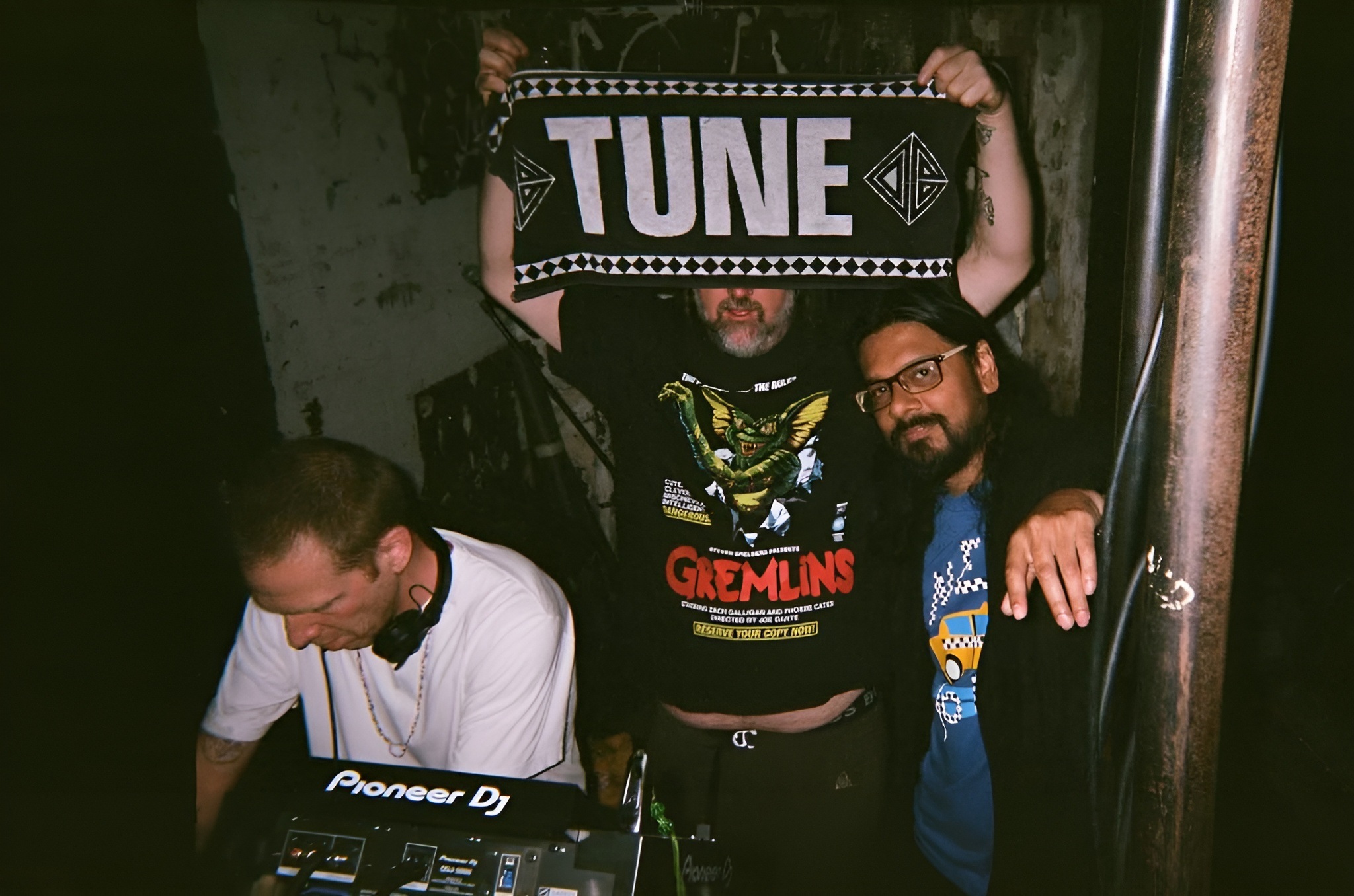
Q: You’ve said before that your sets are crafted like sci-fi ‘journeys’. I feel like that’s a growing trope among many DJ bios, but how did you originally come to that kind of creative decision over how you perform?
KATO: I grew up listening to DJ Shadow, and I like soundtracks. David Holmes did all these soundtracks to movies where he would, you know, combine the dialogue; Trent Reznor did them as well, with different pieces of music, and would blend them a bit like a mix. That was a real big thing in the mid to late 90s, and there were a lot of them. I think David Holmes did the Out of Sight soundtrack, which was a Jennifer Lopez sort of cop movie, but it had really good funk songs and then these really trippy tracks in between them. I was really into that.
When I started deejaying, I wanted to incorporate a bit of that into what I was doing. I like tracks that have a lot of undulating emotion. So I tried to combine that. When I started to play on digital, it felt more like playing a video game or controlling a spaceship. I really enjoyed that, though it took me a long time to get used to digital properly. When I managed to ‘click’ that kind of part of my brain into making it work, it worked a lot better for me, and I was able to move over into enjoying it, if that makes sense. I still enjoy playing a mix of both.
I don't think either way is better than the other. I'm enfranchised to vinyl because I have thousands of records, you know, and I have a lot of good music on vinyl. But I'm quite happy to do that, and I think no one should feel like pressure to do either one.
Q: Some people become really married to specific brands and events, and that's where they celebrate their anniversaries. You have many different events that you run. Why do you think you’ve gone the ‘opposite’ route in celebrating a milestone?
KATO: All of these different parties represent me at different times of my life. I get into heaps of different kinds of music, and I'm always exploring. If I were to do it all under one thing, it would be so confusing. I also think ‘Barney Kato’ is so confusing. I often think to myself, “Oh shit, I'm doing all this different stuff. Do people even get what I'm all about?”
I think there is a unifying theme to it, and I think that’s science fiction, but then there's always been breakbeats and percussion. There's always been synthesisers, sometimes funky, sometimes absolutely not funky.
I was into house music for ages, and then I was like, “I can't play anymore house music.” I started playing electro and got into house music because I was secretly playing breakbeat, which is what I originally started with. Then I was playing electro and I began to play heaps more breakbeats again.
So, as this evolves, I need to change to a different party or start a new brand or something like that.
It’s as confusing for me as it is for everyone else, really.
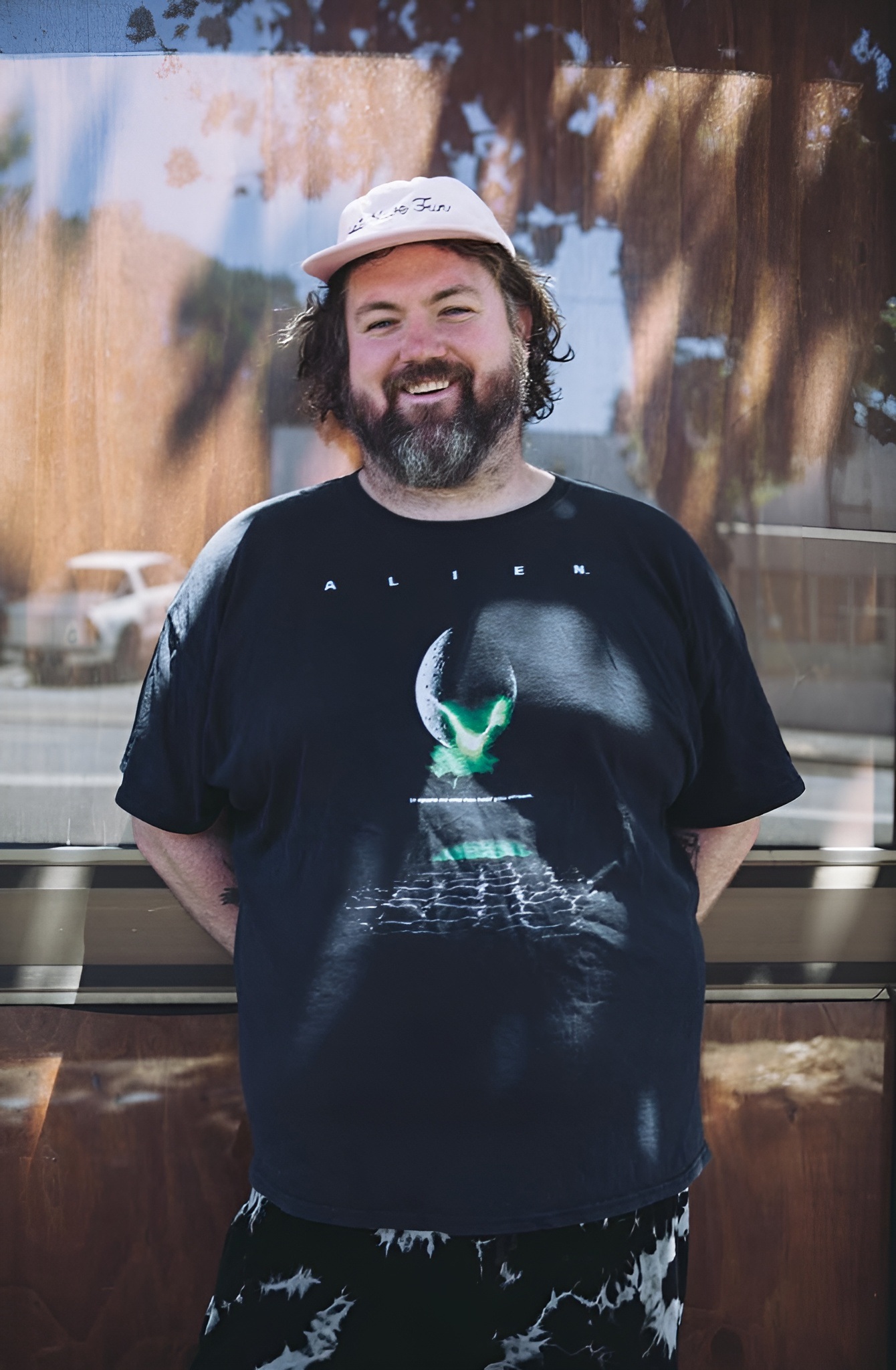
Q: Over the 25 years that you've been deejaying, you've seen countless musical trends that rise and fall and then come back into vogue. What do you think ensures that a sound is able to endure amongst that trend cycle?
KATO: What I tend to see happen with all of these movements is that the first couple of years of a new thing are great. Everyone's making amazing records, and people get inspired, and then that's when those things become really big.
There are those records from the genesis of each thing, which are amazing. When breakbeat hardcore emerged from the rave scene, it was great at the beginning. Then it split into happy hardcore and jungle.
What will always regenerate interest in a genre are these Genesis records. I love the early electroclash records like Miss Kittin and The Hacker, and you know, Felix da Housecat. Over the years, it grew almost to the point where it was like a parody of itself.
I mean, that's how you end up going from Mr. Oizo to ‘Boom Boom Pow’, you know what I mean?
So, the records at the beginning and end of the spectrum are really good, and then in 20 years' time or 15 years or whatever, people are going to rediscover those records.
I can hear a lot of that inspiring new music that’s in turn inspired by the older stuff. I think with electro, for example, it was a lot of Australians. It was Assembly Code, Jensen Interceptor, Reptant, Animalia, and Shedbug that made that exciting for me again.
Q: How do you think that you now view the production of your own music in the grand scheme of your musical career?
KATO: I find it hard to make music that's the music that I would play when I deejay. I can be a bit too self-critical and think it’s not as good as the record I've got. I'm also not the most technically skilled producer ever, so in collaborating, it's often the melding of two ideas, and sometimes that works really well.
Sometimes, I go through phases where I'm not inspired. Because I deejay so much, it distracts from production, which is a bad thing. It's weird to say, but I haven't felt inspired in the last couple of years. But we (Barney In The Tunnel) still get together and make music.
Really, though, I don't want to flood the zone. There's already a lot of music that comes out, and so when I do something, I want it to be as timeless as possible. I'm not saying my music is timeless at all, but that's the idea.
Q: What was the particularly inspirational moment that led you to make a song about the Bathurst 1000?
KATO: There's this way I describe records called ‘Motocross Madness’. There's an old record called Motocross Madness by the Soul Grabber, and I like it when records have the ‘Motocross Madness’ in them.
I hear these records that are like turbines and motors, with inspiration from Detroit, obviously, and I'm not into cars at all, but I definitely hear motors and engines and stuff in music. We were just mucking around in the studio, and I was just talking in this ‘driver’ kind of voice, like “yeah, that’s fuckin’ sick, aye,” and we recorded it.
When I was a kid, we used to watch all those, you know, the Summernats, and even though I'm not interested in it now at all. I watched the Bathurst 1000, like every year when I was a teenager, so it felt natural.
Q: That song has become a bit of a kick-on song for me.
KATO: I love that.
Q: Kato, who inspired you to begin with, particularly around Newcastle?
KATO: It's sort of a weird thing to say, but we were inspired by the void, by not much stuff happening.
There wasn't much stuff happening in Newcastle that we were interested in. I wasn’t going out in Sydney a whole heap at that time. I would go to the Fuzzy parties and watch Kid Kenobi, Ajax, YoungJase and all these deejays. However, we were only attending those larger events.
I'd seen all of them play and really enjoyed it, but there was nothing like that happening in Newcastle. So, we were inspired to do that and bring them to Newcastle. I don't think I followed any particular one of them so much so that I was ‘inspired’ by them, even though the inspiration was to have them come and play for us and to bring that to people in Newcastle.
So we started this party called Nut Cho Breaks, you know, because you're like cracking the nut, me and a friend named Dan Auxillary.
When I first started going to Sydney, I was really keen to see the Bang Gang at Moulin Rouge and similar venues. My friends and I would go from Newcastle to Sydney on the train, and you could catch the train back to Newcastle at 6 in the morning.
You can't really do that anymore. The transport's not as 24-hours as it used to be. That's one of the real bummers of the lockout.
Q: Were there any positives from the lockout laws, in your eyes?
KATO: The lockouts were actually a positive for me personally. I started hosting parties again when the lockouts occurred. I was taking a break from hosting parties, but I was inspired by attending warehouse parties.
It changed my musical perspective a little bit.
During the lockout, we were very lucky. We had this studio in Kings Cross, and we just used to throw parties there all the time, like, free parties, and I got into that. That's what made me start throwing warehouse parties, because there wasn’t much happening. We'd have 200 or 300 people down in the bottom of this studio, this weird space in Kings Cross. We'd lock the gate, and the police wouldn't get in.
I met a lot of new people at that time because the scene was so small; there was a lot of togetherness since only one or two parties would happen on any given night. It brought everything together, even though things got so small, and now it's really exploded to the point where there are 10 to 20 big parties every weekend.
There are always good parties to go to. It's almost too much to choose from now.
Q: Fuck, marry, kill: Breakbeat, electro, house.
KATO: Oh, shit. This is great.
I probably play house music more than anything else, so I would kill house music.
I would probably get into a polycule with breakbeat and electro.
We always talk about this in the store, we're all just fucking playing house music anyway, man. Everything's fucking house music. It doesn't matter. It's all part of one big thing, but maybe house music becomes a bit too big a part of the thing.
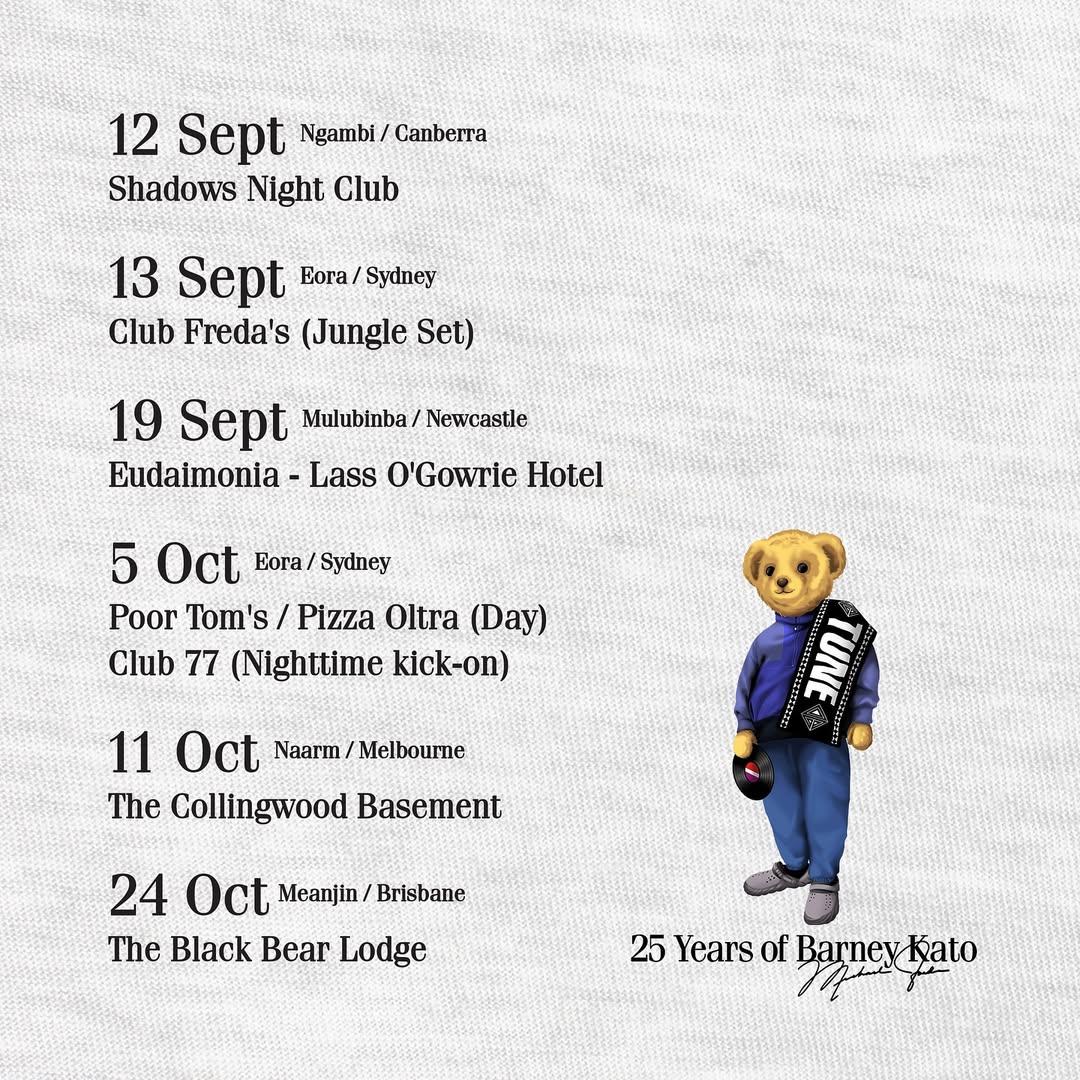
-
Jack Colquhoun is Mixmag ANZ's Managing Editor, find him on Instagram.


